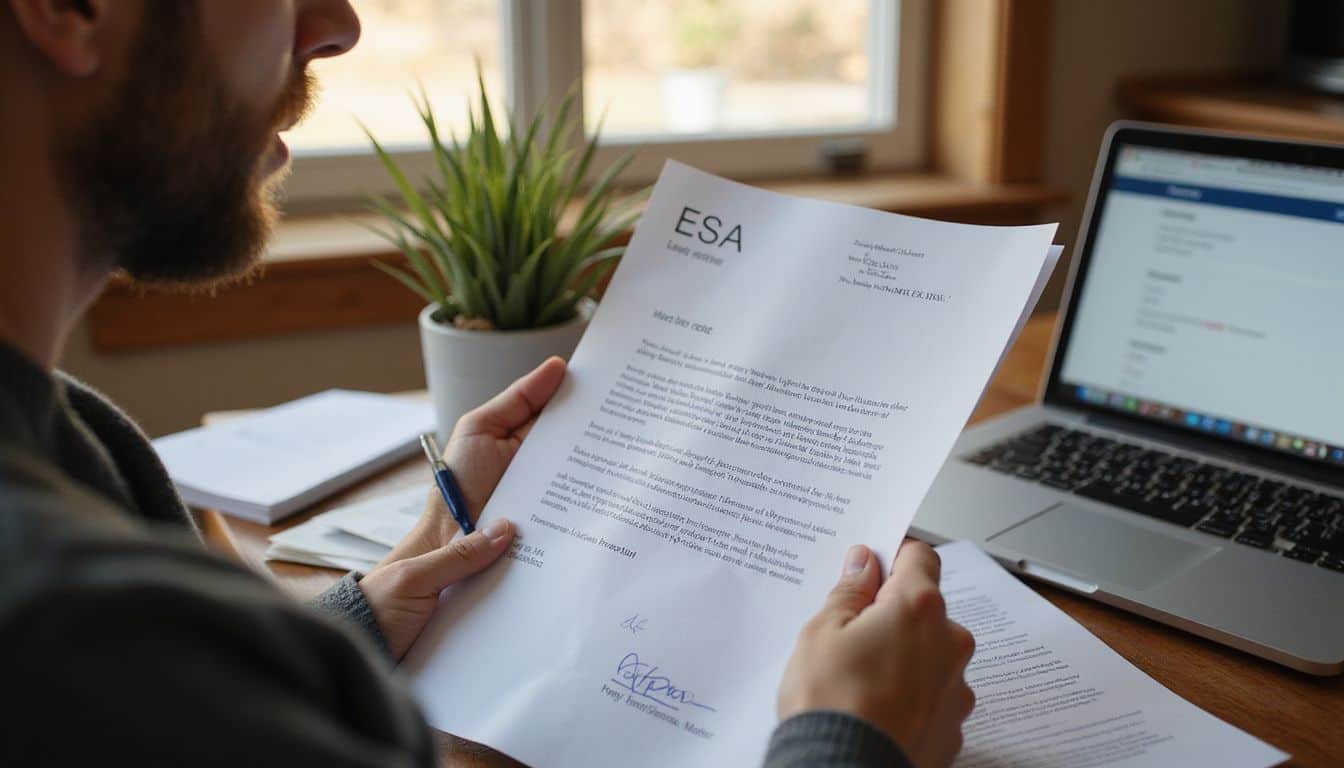Feeling lonely, stressed, or anxious and wondering how to get an emotional support animal for free? In Utah, a valid ESA letter from a licensed mental health professional is all you need—no expensive registrations required.
This post will show six easy tips to help you find trusted providers offering free ESA services and pets. Keep reading for stress-free ways to gain comfort from your own emotional support companion!
Key Takeaways
All you legally need for an emotional support animal (ESA) is a simple letter from a licensed mental health provider—no need to pay for registration or fancy certificates.
Many community centers and nonprofit groups provide free ESA evaluations if you’re dealing with anxiety, PTSD, or depression.
Sites offering “official” ESA registrations typically just want your money; registration isn’t legally required, so save yourself the hassle.
Under the Fair Housing Act, landlords have to accept your ESA—even in housing labeled as “no pets“—and can’t charge you extra pet fees or deposits.
Starting January 11, 2021, airlines mostly stopped accepting ESAs as service animals, so you might have to pay extra fees or bring a carrier.
Table of Contents
What is an Emotional Support Animal (ESA)?

An Emotional Support Animal (ESA) provides companionship and comfort for people dealing with mental or emotional conditions. These pets help ease anxiety issues, PTSD, depression, and other mental health struggles through their comforting presence and genuine affection.
Unlike service animals, ESAs don’t require special task-training—they offer support simply through bonding closely with their owner. Dogs and cats frequently serve as ESAs, but rabbits, ferrets, and even small horses can qualify.
An animal’s breed or size doesn’t matter—what matters is its ability to give emotional comfort.
An emotional support animal isn’t just a pet – it’s a lifeline for those struggling with mental health challenges.
To officially recognize your pet as an ESA, you need a signed letter from a licensed mental health expert. This letter confirms your mental health needs and protects your rights under the Fair Housing Act.
Your ESA can then legally live alongside you in housing with no-pet rules, without any extra charges. Many individuals feel calmer and less lonely through the simple act of petting or caring for an ESA, as these interactions lower stress and boost mood.
Securing the best ESA letter online is a helpful first step toward making your pet an official emotional support companion.
Now, let’s explore how you can get an Emotional Support Animal for free.
Steps to Get an Emotional Support Animal for Free

Getting a free emotional support animal involves a few simple steps that can help you save money while gaining the support you need. You can follow a clear path to obtain your ESA without paying high fees by working with the right resources and knowing what paperwork you need.
Consult a licensed mental health professional

Your journey to an ESA letter begins by locating a licensed mental health professional. You must consult a qualified expert—such as a psychologist, psychiatrist, therapist, or physician—to evaluate your condition.
Personally, I spoke with three therapists before finding one who genuinely related to my anxiety struggles. The licensed professional you choose must hold valid credentials in Utah to issue your ESA letter.
During this consultation, the doctor determines if your mental health condition qualifies for an emotional support animal.
Many providers now offer convenient online meetings to go over your symptoms and personal needs. The therapist may discuss your daily challenges linked to anxiety disorders or other mental health concerns.
Utah and several other states ask for two separate appointments within a 30-day span before issuing your documentation. For me, the online meeting lasted just 20 minutes—but it gave me the right paperwork to keep my emotional support dog in my apartment without trouble.
You will need to renew your ESA letter each year to remain compliant with housing regulations.
Obtain a valid ESA letter

Securing an official ESA letter is a key move in getting approval for your emotional support animal. A valid ESA document appears on formal letterhead and clearly shows your mental health expert‘s license number, signature, and the date it was issued.
Usually, women report paying between $149 to $200 for an authentic ESA letter—this can strain wallets, especially if funds are tight. Free letters rarely hold up legally and might fail to protect you in housing or travel needs.
A valid ESA letter serves as the bridge between your mental health needs and the legal protections available to you and your emotional support animal.
ESA letters typically require annual renewal in states such as Utah to keep protections intact. Only certified mental health experts—including licensed therapists, psychologists, and psychiatrists—can legally issue an ESA letter.
The document needs to clearly tie your emotional support animal to a mental health diagnosis like PTSD, anxiety, or depression; it shouldn’t reveal sensitive medical information.
Ensure the ESA letter meets federal and state requirements

Your ESA letter has to follow specific requirements to be valid. Federal law states clearly—it must appear on your mental health provider’s official letterhead and include their license number.
I found this out myself, after my landlord refused my first ESA letter. This letter also needs a recent date, your provider’s signature, and a clear explanation of why you need an emotional support animal.
Aside from federal rules, your state might have other conditions to fulfill, so double-check local guidelines before submitting one. The Fair Housing Act guarantees your right to live with your emotional support animal, but only if your paperwork meets every legal detail.
ESA letters have a one-year validity, so set a reminder ahead of time. Accurate documentation makes life simpler, reducing uncomfortable talks with your landlord or airline.
Finding a free ESA letter from a licensed mental health professional may sound tricky, but a few reliable services do offer one at no cost.
How to Get a Free ESA Letter

Finding a free ESA letter might seem tough, but many mental health groups offer no-cost assessments for people with anxiety, PTSD, or depression – check out local clinics, online telehealth services, and nonprofit mental health organizations that support emotional wellness through animal companionship.
Look for nonprofits or organizations offering free assessments

Many nonprofits offer free mental health evaluations to individuals seeking emotional support animals. Local community health groups often provide these services, particularly to assist women dealing with anxiety, PTSD, or depression.
I came across several organizations that pair people with licensed mental health specialists—for free. These experts can assess your situation, then decide if an ESA would benefit your emotional health.
Some animal rescue groups even team up with mental health professionals to simplify the process for those unable to cover regular fees.
The right emotional support animal can transform your daily struggle with mental illness into a journey of healing.
You might first reach out to community-based mental health centers in your neighborhood. Certain organizations like Certapet offer online pre-screening tests at no charge. Afterward, they can connect you with a healthcare provider for a complete evaluation.
This quick assessment shows whether you might qualify for an ESA letter. Certapet’s complete service does have fees ranging from $149.99 to $199.99, but their initial screening is entirely free.
If you’re looking for the ideal pet, checking out suitable family dog breeds online can really help narrow down your choice.
Check for free ESA letter programs from licensed providers
Several mental health professionals offer free ESA letter services to support people with mental health issues. After years of dealing with anxiety, I personally found these options incredibly helpful.
Consider therapists who offer pro bono counseling or sliding-scale rates based on your income. Some online therapy platforms even run special deals, like waiving fees for new patients who struggle with PTSD or social anxiety.
Just keep in mind—these programs always require an actual evaluation, not a quick form.
Licensed social workers and psychologists sometimes team up with animal welfare organizations to offer ESA letters without charge. They still perform thorough assessments, carefully reviewing your medical background and symptoms.
Even though these free programs exist, the process can take some patience, since they must look closely at your personal information. Your ESA letter has to meet specific federal standards to qualify for housing protections under the Fair Housing Act.
Steer clear of services promising immediate ESA letters without a real consultation—they simply aren’t reliable.
Registering an Emotional Support Animal for Free

While most states don’t require formal ESA registration, you can find free resources to help document your emotional support animal’s status – click below to learn about legitimate no-cost options and how to spot registration scams!
Is ESA registration required?
No, you don’t legally have to register an ESA in the United States. Beware of websites promising “official” ESA registries—they often target individuals with mental health conditions for profit.
The only valid item you’ll need is an ESA letter from a licensed mental health professional. This letter confirms your eligibility for an emotional support animal under federal law.
Some companies charge between $149 and $200 for these letters, but credible options exist at no cost.
The difference between a scam and a legitimate ESA service is simple: real providers require mental health evaluations, fake ones just want your money.
Companies promoting ESA vests, certificates, or ID cards without proper mental health screenings are usually scams. With a genuine ESA letter, the Fair Housing Act ensures you can keep your emotional support animal in your home—no registration required.
Whether your pet is a golden retriever, a yorkshire terrier, or any other animal, it can legally serve as your ESA without paying for questionable “registration” services.
Free resources for ESA documentation
Unlike formal ESA registration, you can get documentation easily through free resources aimed at women needing mental health support. Several nonprofits offer free ESA letter evaluations for people dealing with emotional disabilities.
Mental health centers often provide these services, supporting those facing conditions like PTSD or bipolar disorder. Certapet, for example, gives a quick, no-cost, five-minute pre-screening exam—perfect for women juggling busy lives—with immediate results.
Local mental health clinics frequently team up with animal rescue shelters, matching emotional support animals to women who need companionship most. Through these arrangements, women receive official ESA letters—at no charge—on proper letterhead satisfying landlord rules under the Fair Housing Act.
With access to these free options, many women easily secure ESA documentation and improve their emotional health along the way.
Additional Free Options for Emotional Support Animals

Beyond getting a free ESA letter, you can find your perfect emotional support companion through local shelters or rescue groups that offer pets at no cost to those with mental health needs – click to learn more about these options and how to avoid common scams when seeking free ESA services.
Adopting a pet from a shelter
Shelter pets can be amazing emotional support animals—and they’re easy on your wallet, too. Local rescues have dogs and cats of all sizes, breeds, and ages who just need someone to love.
I found my spaniel mix at the city shelter, paying only a small fee for her initial vaccines; that saved me a bunch compared to breeder prices. Many shelters even offer free adoptions during special events, and sometimes certain animals have zero fees all year long.
Often, adopted shelter pets arrive already fixed and with basic medical exams done.
Adopting from shelters also helps you dodge extra pet charges from landlords. The Fair Housing Act lets emotional support animals live without the usual pet deposits or monthly fees.
My friend Lisa adopted her sweet shelter cat as an ESA and saved more than $500 in apartment pet costs. Shelter pets typically have life experiences that make them extra sensitive to human feelings; because of that, they naturally form bonds that comfort and ease anxiety or feelings of isolation.
Partnering with animal rescue organizations
Lots of animal rescue organizations offer emotional support animals at no cost to people facing mental health challenges. These groups know how pets can boost emotional health, and many waive adoption fees if you have valid ESA paperwork.
Last year, I contacted three nearby shelters—two out of three had special programs matching rescue pets to folks needing emotional support. You can call local rescue centers to learn more about their ESA placement options.
Some groups also give dogs basic obedience training to prepare them for emotional support roles—this saved me hundreds of dollars on training classes.
Avoiding Scams When Looking for Free ESA Services

Watch out for fake ESA websites that charge high fees for useless “registrations” – learn the warning signs of scams and find real mental health pros who can help you get proper ESA documentation for your emotional support dog… read on to protect yourself and your pet!
Identifying legitimate ESA providers
Identifying genuine ESA providers takes some attention. Authentic providers always ask you to consult with a licensed mental health expert before they issue letters. I once lost $80 on a shady website promising quick approvals—don’t repeat my error! Real ESA letters always appear on official letterhead, clearly listing the professional’s contact details.
Stay alert for red flags, like services offering letters without speaking to you first. Many women fall victim to these scams while looking for support with anxiety or PTSD. Checking a provider’s credentials through your state’s licensing board database is simple and effective.
Taking this easy step helps protect you from scams, and connects you with genuine emotional support. Next, we’ll cover common warning signs of fraudulent ESA services.
Warning signs of fraudulent ESA offers
Now you’re clear on spotting genuine ESA providers—let’s talk about scam services and their warning signs.
Fake ESA websites typically advertise things like “instant approval” or “quick certification”, without ever checking your information. These are obvious tricks to get your money. I made this mistake once, paying $50 for a certificate I thought was real—but it turned out worthless.
Always steer clear of websites that sell ESA letters without any mental health evaluation. Genuine ESA documents must come from qualified mental health professionals who properly assess your situation.
Legitimate providers always confirm your counselor’s credentials through state licensing boards. Companies skipping this step are probably fake—and could cost you big fines or cause legal issues, especially with landlords or airlines.
Sadly, many women become targets for these scams. That’s likely because fake offers promise quick fixes during stressful pet-related housing struggles or emotional hardship.
Rights and Protections for Emotional Support Animals

Emotional support animals enjoy special rights under laws like the Fair Housing Act, which can help you keep your ESA in rental housing without extra fees or deposits – read on to learn how these legal shields protect you and your furry helper in daily life.
Housing accommodations under the Fair Housing Act
The Fair Housing Act strongly protects women who have emotional support animals. Your ESA can stay with you in rental housing—even if the building usually has a “no pets” policy.
Your landlord can’t charge extra fees or deposits for your support animal. This legal protection covers all rental homes, including apartments, condos, townhomes, and single-family houses.
I once assisted my sister in getting approval for her ESA to live in a “no pets allowed” building; we simply gave the property manager the official ESA documentation, and everything was set.
Your rights extend beyond just keeping your animal at home. Landlords need to provide “reasonable accommodations” for your emotional support animal, and they can’t refuse your application due to mental health-related needs.
You’ll have to make a formal request along with an ESA letter, printed on official letterhead from a qualified professional. The law also prevents landlords from enforcing breed or size limits that apply to regular pets.
Many women find peace knowing their cats, dogs, or other ESAs can live anywhere—without worrying about size or breed restrictions.
Travel allowances for ESAs
Travel rules for emotional support animals changed on January 11, 2021—and they’re stricter now. Most airlines now classify your emotional support animal (ESA) as a regular pet instead of a service animal.
That means your dog or cat no longer flies free or gets special cabin privileges on domestic airlines. Today, major U.S. carriers usually require pet carriers and fees, even if you have medical paperwork.
Airlines typically ask for at least 48 hours advance notice if you’re flying with an ESA.
For international flights, a few airlines still let ESAs fly under special conditions, but paperwork demands are pretty strict and choices limited. Airlines often need specific mental health forms and may request details from a licensed professional explaining your condition.
Women dealing with anxiety disorders or post-traumatic stress disorder (PTSD) should always double-check airline policies before buying tickets. Rules vary widely among international airline companies and countries—even small details can make a difference.
Policies around emotional support animals may keep shifting, so stay updated on airline announcements for upcoming flights.
How Will Emotional Support Animal Practices Evolve in 2025?

Big changes are coming for emotional support animal policies by 2025. Airlines now treat ESAs as regular pets, not service animals—this shift means tougher travel rules for people with mental health issues.
Stricter regulations on bringing ESAs into public spaces might soon follow. Getting an ESA letter costs around $150-$200 today, but new requirements for detailed mental health evaluations may push fees even higher.
Many mental health providers could turn to telehealth consults, making assessments simpler for those dealing with PTSD or social anxiety.
Future standards for emotional support animals will likely include better training guidelines. Some groups could start programs matching specific ESAs to certain mental health concerns.
Insurance providers may soon cover a portion of ESA-related expenses, recognizing the benefits these animals offer in easing loneliness and boosting emotional wellness. As studies increasingly prove that dogs better than people can calm anxiety disorders and stabilize mood, healthcare providers could begin embracing ESAs as reliable mental health tools.
People Also Ask
What is an emotional support animal, and how can it help with mental health conditions?
An emotional support animal offers comfort and companionship to people experiencing mental health disorders—including PTSD, panic attacks, or social anxiety. They boost emotional stability, ease distress, and help their owners relax through warmth and affection.
How do I qualify for a free emotional support animal?
You’ll need a mental health condition that’s officially recognized in the Diagnostic and Statistical Manual of Mental Disorders. A licensed medical expert must confirm your condition through an official ESA letter. Some animal shelters will offer pets at no charge if you present proper ESA certification.
Can I get an ESA letter without visiting a doctor in person?
Yes, online tele-health services make it easy to connect virtually with certified healthcare providers. Many mental health professionals offer remote consultations and can provide ESA letters without an in-person visit.
Do emotional support dogs require special training?
Emotional support dogs don’t require specific training like service animals do. Basic obedience, good manners, and crate training are good enough. Their chief job is simply to offer comfort, emotional support, and companionship.
What benefits come with having an ESA letter?
An ESA letter lets you keep your pet even in apartments or housing complexes where animals aren’t usually allowed. In the past, an ESA letter allowed pets on airplane rides under the Air Carrier Access Act, but airlines—including Flair Air—have since changed their policies. You’ll need to renew the ESA letter periodically to keep these housing rights.
What types of animals make good emotional support pets?
Dogs are the most popular choice—small breeds like Cavalier King Charles Spaniels are especially loved. Plenty of other animals can also offer comfort, joy, and reassurance, making them ideal emotional support companions. The perfect ESA matches your routine, personal preferences, and specific mental health needs.
References
https://screening.mhanational.org/content/how-do-i-get-emotional-support-animal/
https://www.certapet.com/emotional-support-animal/
https://www.splootvets.com/post/emotional-support-animal-registration-in-colorado (2025-02-14)
https://www.certapet.com/esa-by-state/ohio/
https://www.certapet.com/esa-by-state/florida/
https://www.certapet.com/emotional-support-animal-registration/
https://www.thepennyhoarder.com/save-money/emotional-support-animal-savings/ (2024-06-27)
https://www.umassmed.edu/TransitionsACR/resources/emotional-support-animals-101/
https://digitalcommons.usu.edu/cgi/viewcontent.cgi?article=9701&context=etd
https://pettable.com/blog/are-online-esa-letters-legitimate
https://snappt.com/blog/esa-fraud/ (2025-03-26)
https://mn.gov/mdhr/yourrights/service-animals/housing.jsp
